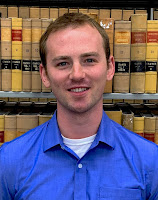By Joseph
Zeitler
Joseph Zeitler is a second-year student at Albany Law School where he is also a
member of the Albany Law Review. Joseph has worked as both a law clerk at a
local Albany law firm and as a legal intern at the New York State Attorney
General’s Office.
Prior to attending law school, Joseph spent three years on
the West coast working in the aerospace industry. In 2014, he graduated
from Clarkson University where he majored in Supply Chain Management with a
minor in Literature.
This summer, Joseph will be at the law firm of Whiteman, Osterman,
& Hanna, LLP in Albany as a summer associate.
This presentation was
prepared for Prof. Bonventre’s Court of Appeals Intensive seminar in the Spring of 2020.
On the reforms made on the jury selection process, Judge Kaye stated, “Symbolically, it told the public that we all stand equal before the law, that no person, no group, is more powerful or privileged so as to be automatically excused from a fundamental obligation of citizenship.”
Judge Kaye helped implement problem-solving programs in New York’s justice system. These programs provided services such as drug counseling and job training. Instead of continuing the vicious cycle of imprisoning drug addicts, the justice system was working to break the cycle by providing services to reduce recidivism. These programs, while non-traditional and progressive at the time, had positive results, and New York State became a national leader in problem-solving justice.
During her career, Judge Kaye made significant progress in improving family justice, which was her passion. Her efforts helped to both improve the quality of life for children in foster care and increase adoption rates in New York. As Judge Kaye stated, “Every kid deserves to be valued, to have an opportunity at life. And every one of us can contribute to accomplishing that. My Purpose is to help make it happen.”
Judge Kaye’s life serves as a reminder to those of us in the legal field and beyond. She never lost sight of what she knew was important: protecting and serving the vulnerable populations of our communities.
_________________________

